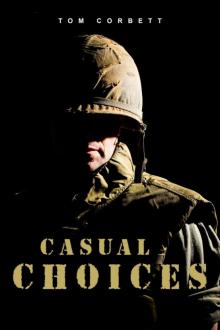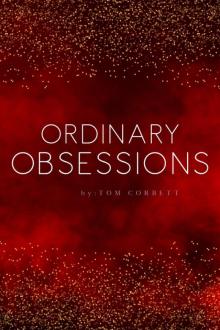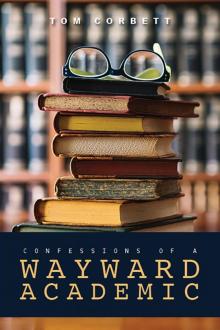- Home
- Tom Corbett
Ordinary Obsessions
Ordinary Obsessions Read online
Reviews of the author’s fictional works:
“Palpable Passions delivers a compelling story arc infused with historical fact that should appeal to readers…”
Blue Ink Reviews
The book…feels like a screenplay; its dialogue is abundant and punchy, its landscapes well defined, and its characters have significant bonds. Palpable Passions uses bright, earnest characters to show that a microcosm can be as complicated as the big picture.”
Foreword Book Review
“Corbett has created a captivating novel. The book title perfectly describes the fragile thread that spirals around each individual…to create an enthralling story that anyone will love to read.”
U.S. Review of Books
“This is…a fully rendered tale. Those interested in the complexity of relationships…will find some rewards here.”
Blue Ink Reviews
“…Tenuous Tendrils, by Tom Corbett, is a compelling journey from exile to redemption. Like its characters, the book is quite clever and features an abundance of humor. Many heavy scenes are punctuated by conversations about the futility of war and the humanitarian failings of government also feature omniscient narrative wit that keeps the text from being bogged down by sentiment and also allows the characters’ personalities to shine.”
Clarion Review
“Corbett obviously loves to tell stories. Tenuous Tendrils, by Tom Corbett, is a captivating read with engaging vignettes which paint a picture of a retired professor, his life, and the connections which bind everything together.”
Pacific Review of Books
Amazon Readers’ Reviews of
Tenuous Tendrils and Palpable Passions.
“I loved how the author told each family’s story back and forth chapter by chapter. The characters are so well-formed, and the accurate descriptions of life in Afghanistan really drew me in. Finished book in one day. I didn’t want to put it down.”
“This is truly a great read that will leave you feeling empowered and determined to make a difference in your own way HIGHLY RECOMMEND that everyone pick this up.”
“It’s easy to understand why this book comes so highly recommended. Palpable Passions is a powerful book. I highly recommend it to anyone who loves literary fiction.”
“A penetrating look into the human soul and the fragility of relationships.”
“Tenuous Tendrils is a conversational and meditative look back on a man’s life. I really like the depth of detail that the author brought to these characters.”
“This book was incredibly personal on so many levels. Overall, I found this to be an extremely touching and educational read.”
“I personally loved this book. It was refreshing and thoughtful.”
“The overall story is incredibly genuine, realistic to the time limits it covers and thoughtful. Each time I put down the book I found it moderately difficult since I wanted to know what would happen next.”
“Excellent characterization and historical facts make this a compelling story as hope overcomes despair.”
“Tom Corbett’s “Palpable Passions” is the perfect combination of fact and fiction as it educates its readers about current events in our world today.”
“In the end, we learn that no matter what this world throws in our way, our passion is what drives us to live our lives to the fullest potential. This book fascinates me because of how the author uniquely ties everything together at the end.”
“This is an utterly compelling narrative of two disparate families separated by culture and experiences who come together by circumstances and serendipity.”
Selected Praise for the Author’s Non-Fiction Works
“A wonderful first-person account of the ground-level of welfare reform in recent times. It was a momentous time for reform of the nation’s welfare system and Corbett was in the thick of it. He relates what happened with a wry, self-deprecating of humor, but there are serious lessons to be learned…”
—Robert Moffitt, Ph.D.,
Professor of Economics, Johns Hopkins U.
“Tom Corbett exposes the reader to the raw reality of confronting our most difficult social issues in this engaging, compelling, yet witty book. He brings the doing of policy alive, going beyond the dry numbers to reveal the human side of the equation.”
—Dennis Dresang, Ph.D.,
Professor of Public Policy, U. of Wisconsin
“…I found “Ouch. Now I Remember” to be a witty yet edifying read, riddled with some funny moments…with many of them making me laugh out loud. I enjoy his writing style, it was comforting yet candid, like listening to a respected relative recount their own life with unabashed honesty.”
—Pacific Book Review
“…throughout the memoir, Corbett’s prose remains engaging, consistently mixing insight with the familiar jokes that one would from a close friend. A thoughtful memoir about life and politics told in a (n}…endearing style.”
—Kirkus Review
“…the emergence of Corbett’s humanistic world view…gives Ouch, Now I Remember intellectual gravitas. Corbett imparts an enormous amount of wisdom and humanity.”
—Clarion Review
“If you truly want to understand how public policy works, read this book. Corbett’s descriptions about how laws and programs are developed gives readers a real take away—genuine insight into the discipline of public policy.”
—Mary Fairchild, Senior Fellow
National Conference of State Legislatures
“Corbett’s stories from the front lines of policymaking, like All Quiet on the Western Front or The Things They Carried, provide great insight into the way the world actually works, not what the generals or policy planners think is happening.”
—Matt Stagner, Ph.D. Policy Fellow
Mathematica Policy Research, Inc.
“The Boat Captain’s Conundrum is a winning performance.”
—Forward Clarion Book Review
“Corbett takes a topic often shrouded in numbers and dense writing and turns it into an intellectual, yet conversational memoir.”
—U.S. Review of Books
“Corbett’s reflections, woven together with great insight and humor, transform public policy from a class that is boring and mundane to a career that can be engaging and germane.”
—Karen Bogenschneider Ph.D., U. of Wisconsin
“I enjoy his writing style, it was comfortable yet candid, like listening to a respected relative recount their own life with unabashed honesty.”
—Pacific Book Review
Title: Ordinary Obsessions
Copyright © 2019 by Tom Corbett. All rights reserved.
No part of this publication may be reproduced, stored in a retrieval system or transmitted in any way by any means, electronic, mechanical, photocopy, recording or otherwise without the prior permission of the author except as provided by USA copyright law.
Published in the United States of America
ISBN hardcover: 9781948000345
ISBN softcover: 9781948000352
eISBN: 978-1-9480004-5-1
DEDICATION
I dedicate this work to my spouse, Mary Rider. She now is enduring difficult times. Still, we have enjoyed almost five decades of remarkable moments and wonderful memories
ACKNOWLEDGMENTS
I want to give special thanks to Christine Tighe and Hilla Zerbst for reading and commenting on early versions of this manuscript. I also want to thank Ben Harris and Zoe Ryan of Papertown Publishing for seeing this project through to completion.
Other Books by the Author
Confessions of an Accidental Scholar (Hancock Press, 2018)
Confessions of a Clueless Rebel (Hancock Press, 2018)
Confes
sions of a Wayward Academic (Hancock Press, 2018)
Palpable Passions (Papertown Press, 2017)
Tenuous Tendrils (Xlibris Press, 2017)
The Boat Captain’s Conundrum (Xlibris Press, 2016)
Ouch, Now I Remember (Xlibris Press, 2015)
Browsing through My Candy Store (Xlibris Press, 2014)
Return to the Other Side of the World with Mary Jo Clark, Michael Simmonds, Katherine Sohn, and Hayward Turrentine (Strategic Press, 2013)
The Other Side of the World with Mary Jo Cark, Michael Simonds, and Hayward Turrentine (Strategic Press, 2011)
Evidence-Based Policymaking with Karen Bogenschneider (Taylor and Francis Publishing, 2010)
Policy into Action with Mary Clare Lennon (Urban Institute Press, 2003)
“You can’t go back and change the beginning, but you can start where you are and change the ending.”
—C. S. Lewis
“I think hell is something you carry around with you, not somewhere you go.”
—Neil Gaiman
“Men never do evil so completely and cheerfully as when they do it from religious conviction.”
—Blaise Pascal
“What good fortune for governments that men do not think.”
—Adolf Hitler
“Kindness is the language that the deaf can hear and the blind can see.”
—Mark Twain
CONTENTS
Preface
Part I Choices
Chapter 1 Oxford University-2015: The Call
Chapter 2 Radcliffe Square
Chapter 3 The Hairy Hare
Chapter 4 Christ Church Meadow
Chapter 5 Chicago
Chapter 6 Kashmir, India
Chapter 7 Afghanistan
Chapter 8 The Patriarch
Chapter 9 Oxford England: A Decision
Part II Challenges
Chapter 10 Madtown: Summer 2016
Chapter 11 The Emails
Chapter 12 The 2016 Election Looms
Chapter 13 Post 2016 Election: Afghanistan
Chapter 14 Pre-Christmas: London 2016
Chapter 15 Christmas Day
Chapter 16 Post-Christmas: Daytrip To Oxford
Chapter 17 The Windy City
Chapter 18 Summer Of 2017
About The Author:
PREFACE
Ordinary Obsessions is the sequel to Palpable Passions, which introduces the reader to the Masoud and the Crawford families. The patriarch of the Masoud family, Pamir, is a physician who trained in England. Pamir returns to Afghanistan to aid his homeland and raise his children. Pamir’s wife, Madeena, is a mathematician who taught at university level in the pre-Taliban era. We tend to forget that this beleaguered country once had a substantial secular population.
The Masouds have three children: a son, Majeed, and two daughters, Deena and Azita. The youngest, Azita, is passionate about following in her father’s footsteps despite the obstacles imposed by a totalitarian religious regime. In the first volume, we picked up the Masoud’s story during the height of Taliban rule, but prior to Osama Bin Laden’s 9-11 attack on the United States. The Masouds were determined to escape Kabul and the oppressive rule under which they felt captive. The family’s goal was to flee to the area still held by the Northern Alliance, a group of tribal clans who bravely fought the Soviet invaders in the 1980s, and who are now fiercely opposed to Taliban rule. This northern area in Afghanistan is where Pamir was born and raised. It is home to him, a place where he hopes to find comfort and safety in troubled times, and where his children might pursue their dreams.
The Crawford clan is headed by Charles Crawford, Sr., who was born in Poland just as World War II erupted. He was spirited to the United States by his father who was a leader in the anticommunist, exiled Polish government. Charles Crawford grew up determined to accrue personal power and great wealth, part of which he obtained through a calculated marriage to Mary Kelly, a rich Catholic socialite from Philadelphia. Charles and Mary have four children: Charles Junior (Chuck), the oldest (and married to Beverly), followed by twins, Christopher (Chris) and Kristen (Kay), and their youngest daughter, Katerina (Kat). The Crawford family members know extraordinary comfort and privilege in Chicago but are gripped by serious internal divisions that eventually mushroomed into outright rebellion.
Other prominent characters include Abdul Zubair, an old family friend who helps the Masouds escape from the control of the Taliban, and Abdul’s son, Ahmad. Richard (Ricky) and his sister Juliana (Jules) Jackson are unlikely childhood friends of Chris. Ricky and Jules are black and from very modest means, growing up in a tough Chicago neighborhood. Chris and Ricky bonded at a high school summer basketball camp and remained the best of friends throughout adulthood. Chris and Jules enjoyed a long on and off romantic relationship over the years. Karen Fisher is Chris’s lesbian assistant in his international service organization. From a working-class British family, Karen is a tough, yet perceptive, professional partner. Amar Singh is an Indian-born doctor whose struggle to become a physician was made more difficult by her conservative family who wished little more than a good marriage for her.
Chris’s twin sister, Kay, is a talented trauma surgeon who earned her medical expertise by attaching herself to the emergency room of a Chicago public hospital, partly out of dedication and partly to spite her father by working for the public good, something she knew her father would never understand. Kay married James (Jamie) Whitehead, a British Military doctor whom she met in Afghanistan.
The narrative of Palpable Passions traces challenges and struggles in both the Masoud and Crawford families. With the help of her parents, Azita continues to violate the strict rules governing the proper behavior of Muslim girls. She stubbornly insists on being educated at home by her mother and on helping her father with his medical work, sins that will no longer be tolerated by the Taliban as she approaches puberty. Azita will then be expected to become a servile and obedient woman as Taliban orthodoxy dictates. After Azita is almost killed by the religious police while she is under Majeed’s protection, Majeed is determined to fight these oppressors. The Masouds decide to escape Kabul and the Taliban when Majeeb is about to be forced into military service for a system he abhors. Under false pretenses, the Masoud family makes a very dangerous escape to the Northern Alliance.
Following the sudden and tragic suicide of Chuck Crawford, who had been the forced heir-apparent to the Crawford dynasty, much reflection takes place among the remaining Crawford offspring who come to reject their father’s obsession with right-wing causes. Christopher, a Rhodes scholar with a doctorate from Oxford, uses his wealth and connections to develop an international service organization. Chris is devoted to helping the world’s most vulnerable people and is most gratified that his father dismisses these ambitions as soft and ridiculous. Chris makes his home in London and Oxford, England. Kay has also rejected her father’s ideals by her choice of medical specialties. She decides to escape the family in Chicago by joining Chris’s international organization and manipulates her initial assignment in Pakistan to relocate to Afghanistan, a very dangerous site at that time. There, she becomes friends with Dr. Amar Singh and the two risk all to help those desperately holding out against the Taliban. Chris is outraged when he discovers that his sister defied him and joined Amar Singh in the conflict torn and dangerous country. Frantic, he travels to Afghanistan to remove Kay from harm’s way.
The Masoud and Crawford families connect in this desperate and conflicted part of the world. Representing radically different backgrounds, they find much in common. However, fate, as it so often does, intrudes in the most disturbing ways. Majeeb Masoud dies fighting for the Northern Alliance. Pamir and Madeena Masoud are murdered by the Taliban in the tumultuous days following 9-11. Kay stays in Afghanistan with Jamie Whitehead, and Chris finally loses his heart to Amar Singh.
Moved by the intelligence and drive of young Azita, Chris and Amar bring her to England wher
e she can receive the education about which she has always dreamed but did not think possible. After some time, Deena and Karen, now in a relationship, join Azita, Chris and Amar in London. Palpable Passions ends with Azita Masoud finishing her pre-medicine studies at Oxford University and giving a University-wide talk about the obstacles she overcame to pursue her passion. That, however, is not the end of the journey. Rather, it is just a beginning.
PART I CHOICES
CHAPTER 1
OXFORD UNIVERSITY-2015 : THE CALL
Chris Crawford settled into his university office. He looked about him with much satisfaction. The walls were lined with books while his desk and a couple of tables were piled to overflowing with academic papers and government reports. Yet, he had a rather amazing ability to retrieve what he needed. The detritus of his fecund intellectual life was not unlike an archeological site where layers of invaluable treasures were accessible only to the expert who knew where and how to look. His gaze briefly settled on the world beyond his personal academic cocoon. Outside of his dome-like windows, which were reminiscent of cathedral portals, lay the college green that served as the epicenter of academic life in the insular world of his Oxford college. He loved everything about this place, even the smells of ancient thoughts embedded on printed pages.
He found it remarkable that he had been so easily accepted into this world-class university. That made him smile since he had been such an undisciplined student early on, the very opposite of his twin sister who had always applied herself diligently to her academic studies. He had always rationalized his desultory performance as a student on the examples of Einstein and Hawking, the two physics geniuses of their respective eras. Einstein had been an indifferent student. Albert’s original dissertation was turned down by his doctoral committee and he was the only member of his small physics class not to secure an academic appointment upon graduation. He made his significant early intellectual breakthroughs while sitting in a patent office, a position arranged for him by concerned friends. Similarly, Hawking always admitted to hardly studying during his undergraduate days at Oxford and with not much greater diligence early in his doctoral studies at Cambridge. He fully embraced his intellect only when his body started to give out on him. Both geniuses proved most creative when they permitted their imaginations to run free and when, for different reasons, they functioned outside of the normal expectations of the academic culture. Chris fancied that he did as well though absent, he concluded, the clear advantage of their native genius.

 Casual Choices
Casual Choices Ordinary Obsessions
Ordinary Obsessions Confessions of a Wayward Academic
Confessions of a Wayward Academic